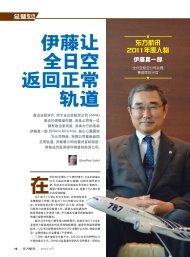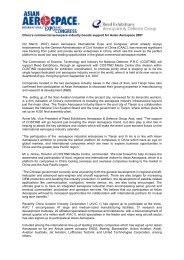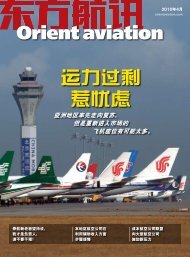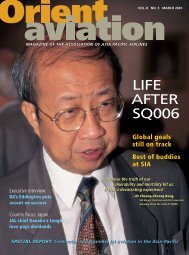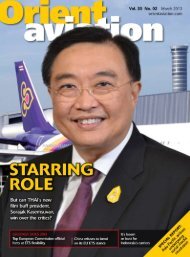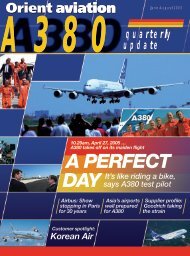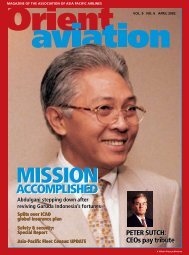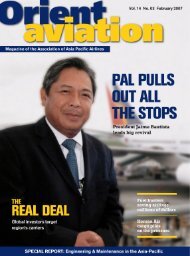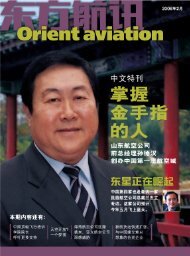Create successful ePaper yourself
Turn your PDF publications into a flip-book with our unique Google optimized e-Paper software.
49TH ASSEMBLY OF PRESIDENTS<br />
Assembly resolutions<br />
Avian Flu, fuel, insurance, user fees...<br />
The heads of the 17 member<br />
airlines of the Association of<br />
Asia Pacific Airlines (AAPA)<br />
passed eight resolutions at<br />
their annual Assembly of<br />
Presidents signalling their intention to<br />
work on various fronts ranging from health<br />
issues such as the threat of a flu pandemic,<br />
winning fuel savings through optimization<br />
of air routes (see below), security charges,<br />
insurance premiums and onerous aviation<br />
levies on airlines and passengers.<br />
Among the resolutions passed by the<br />
assembly were:<br />
• In the face of concerns regarding a<br />
potential Avian Flu pandemic, a call on<br />
governments, health authorities and the<br />
media to act responsibly during health related<br />
crises to avoid inciting public panic.<br />
• An appeal to governments to introduce<br />
direct routing and operational measures<br />
at airports to reduce fuel wastage and<br />
improve airspace utilization, as well as<br />
strengthened collaboration with airspace<br />
users and air navigation service providers<br />
in taking advantage of available technology<br />
and operational techniques to provide<br />
efficiencies.<br />
The AAPA also wants better coordination<br />
and cooperation with military authorities<br />
to enable more effective and efficient use<br />
of airspace.<br />
• A call on governments to provide<br />
appropriate support to airlines in light<br />
of proposals by the insurance market to<br />
invoke new aviation insurance exclusions.<br />
These would preclude cover for damage<br />
caused by “weapons of mass destruction”<br />
(nuclear, biological, chemical, radioactive<br />
or electromagnetic weapons). Without such<br />
cover some airlines may not be able to operate<br />
under various countries’ regulations.<br />
• Calling on governments to carefully<br />
consider the economic effects of putting<br />
further financial strain on airlines and to<br />
exercise restraint in increasing the burden<br />
of levies on airlines and passengers.<br />
• Renewing a call for fair and reasonable<br />
user charges imposed by aeronautical<br />
service providers and airports. Airlines said<br />
they already face numerous and increasing<br />
cost pressures in the form of operating<br />
costs, taxes and charges that directly affect<br />
commercial growth. They said current<br />
levels of airport charges remain excessive<br />
and disproportionate to the cost structure of<br />
airports.<br />
• Want governments to recognize the<br />
provision and cost of aviation security should<br />
be borne by them from general revenues and<br />
not from taxes and user charges. Airlines,<br />
which have seen their security costs<br />
skyrocket since 9/11, also want security<br />
standardization. At present they often have<br />
to meet different requirements in dozens of<br />
different countries.<br />
The path to lower fuel costs<br />
Asia-Pacif ic airlines are<br />
lobbying governments and<br />
service providers to shorten<br />
flight paths and improve<br />
approaches to airports to cut<br />
fuel costs.<br />
With fuel now averaging 28% of their<br />
operating costs, up from 20% a year ago, the<br />
carriers said because those responsible for<br />
air space utilization and procedures “are not<br />
hit in the pocket by fuel costs” there was less<br />
incentive for them to improve the situation.<br />
Yet it has been estimated changing<br />
unnecessarily complex approach and takeoff<br />
patterns at airports and non-optimal<br />
routings could save as much as 18% of the<br />
world airlines’ entire fuel bill, according to<br />
Association of Asia Pacific Airlines (AAPA)<br />
director general, Andrew Herdman. “That<br />
obviously has a financial implication for<br />
the entire industry, not to mention the<br />
environmental implications of reducing<br />
emissions,” he said.<br />
He was commenting on a resolution<br />
passed by the airline grouping at its annual<br />
Assembly of Presidents and made a strong<br />
appeal to governments to “immediately<br />
introduce direct routing and operational<br />
measures at airports to reduce fuel wastage<br />
and improve airspace utilization”. It said<br />
optimizing fuel efficiency depends on many<br />
external factors, including route structure, air<br />
traffic flow management and airport capacity<br />
and layout.<br />
The AAPA’s 17 member airlines will pay<br />
US$18 billion for fuel this year, up from $12<br />
billion in 2004. Herdman, who said airlines<br />
had been “very successful in transferring<br />
vast sums of money to oil producers<br />
and oil companies”, explained airspace<br />
improvements required a lot of co-ordination<br />
between governments, air traffic providers<br />
and airports. “We are simply asking for a<br />
greater effort in that regard,” he said.<br />
Cathay Pacific Airways chief executive,<br />
Philip Chen, who chaired the 49th AAPA<br />
Assembly, said the association believed<br />
governments must take immediate action to<br />
deliver the change that everyone needed.<br />
“Tremendous savings would be made if<br />
airlines could operate on more direct routes.<br />
Small changes to straighten airways would<br />
make a huge difference in saving money, fuel<br />
and helping the environment. The resolution<br />
is a strong statement by an aviation group<br />
that comprises leading airlines in the Asia-<br />
Pacific and underlines the importance for<br />
governments to take immediate appropriate<br />
action,” said Chen.<br />
Straightening some airways saved US$1.1<br />
billion in 2004. Shaving just one minute off<br />
every flight operated in the world today<br />
would save more than US$2.7 billion and<br />
millions of tonnes of fuel a year, according to<br />
the International Air Transport Association<br />
(IATA).<br />
14 ORIENT AVIATION DECEMBER 2005-JANUARY 2006


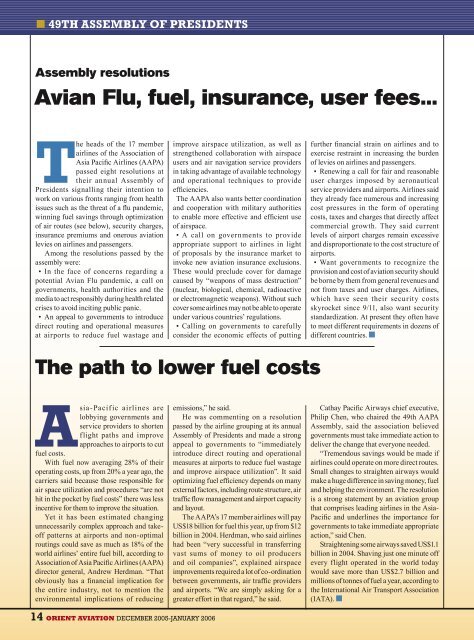
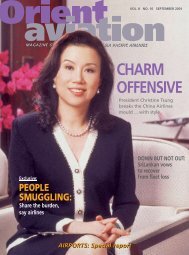
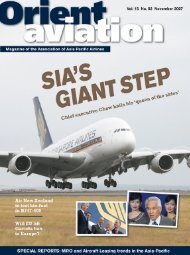
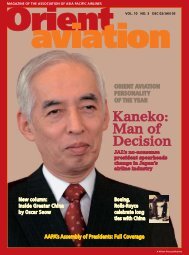
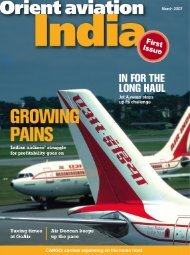
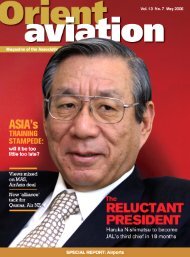
![OAMag-V7N4-Cover [Converted] - Orient Aviation](https://img.yumpu.com/48598575/1/190x255/oamag-v7n4-cover-converted-orient-aviation.jpg?quality=85)
